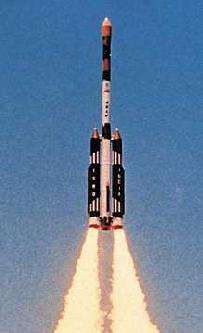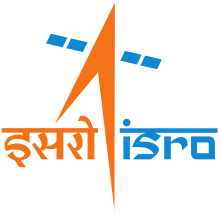Augmented Satellite Launch Vehicle
The Augmented Satellite Launch Vehicle or Advanced Satellite Launch Vehicle, also known as ASLV, was a Small-lift launch vehicle five-stage solid-fuel rocket developed by the Indian Space Research Organisation (ISRO) to place 150 kg satellites into LEO.[1] This project was started by India during the early 1980s to develop technologies needed for a payload to be placed into a geostationary orbit.[2][3] Its design was based on Satellite Launch Vehicle.[4] ISRO did not have sufficient funds for both the Polar Satellite Launch Vehicle programme and the ASLV programme at the same time and the ASLV programme was terminated after the initial developmental flights.[2] The payloads of ASLV were Stretched Rohini Satellites.[4]
 ASLV liftoff | |
| Function | Small launch vehicle |
|---|---|
| Manufacturer | ISRO |
| Country of origin | India |
| Size | |
| Height | 23.5 m (77 ft) |
| Diameter | 1 m (3 ft 3 in) |
| Mass | 41,000 kg (90,000 lb) |
| Capacity | |
| Payload to 400 km LEO | 150 kg (330 lb) |
| Associated rockets | |
| Family | SLV, Polar Satellite Launch Vehicle |
| Launch history | |
| Status | Retired |
| Launch sites | Sriharikota |
| Total launches | 4 |
| Successes | 1 |
| Failures | 2 |
| Partial failures | 1 |
| First flight | 24 March 1987 |
| Last flight | 4 May 1994 |
| Notable payloads | SROSS |
| First stage | |
| Engines | 2 solid |
| Thrust | 502.6 kN (113,000 lbf) each |
| Specific impulse | 253 seconds (2.48 km/s) |
| Burn time | 49 seconds |
| Fuel | Solid |
| Second stage | |
| Engines | 1 solid |
| Thrust | 702.6 kN (158,000 lbf) |
| Specific impulse | 259 seconds (2.54 km/s) |
| Burn time | 45 seconds |
| Fuel | Solid |
| Third stage | |
| Engines | 1 solid |
| Thrust | 304 kN (68,000 lbf) |
| Specific impulse | 276 seconds (2.71 km/s) |
| Burn time | 36 seconds |
| Fuel | Solid |
| Fourth stage | |
| Engines | 1 solid |
| Thrust | 90.7 kN (20,400 lbf) |
| Specific impulse | 277 seconds (2.72 km/s) |
| Burn time | 45 seconds |
| Fuel | Solid |
| Fifth stage | |
| Engines | 1 solid |
| Thrust | 35 kN (7,900 lbf) |
| Specific impulse | 281 seconds (2.76 km/s) |
| Burn time | 33 seconds |
| Fuel | Solid |
Vehicle
The ASLV was a five-stage vehicle. Two strap-on boosters acted as a first stage, with the core stage igniting after booster burn out. The payload capacity of the ASLV was approximately 150 kg (330 lb) to an orbit of 400 km (250 mi) with a 47-degree inclination.[4]
At liftoff, the ASLV generated 909.9 kN (204,500 lbf) of thrust. It was a 41,000-kilogram (90,000 lb) rocket, measuring 23.5 metres (77 ft) in length with a core diameter of one metre (3 ft 3 in).[4] The height to diameter ratio of ASLV was very large which resulted in the vehicle being unstable in flight. This was compounded by the fact that many of the critical events during a launch like the core ignition and the booster separation happened at the Tropopause where the dynamic loads on the launcher was at the maximum.[5]
History
The ASLV made four launches, of which one was successful, two failed to achieve orbit, and a third achieved a lower than planned orbit which decayed quickly. The type made its maiden flight on 24 March 1987, and its final flight on 4 May 1994.
Launch statistics
- Failure
- Partial failure
- Success
Launch history
All four ASLV launches occurred from the ASLV Launch Pad at the Sriharikota Range. For vertically integrated ASLV, many SLV-3 ground facilities were reused but a new launch pad with retractable Mobile Service Structure was constructed within the same launch complex.[6]
| Flight № | Date / time (UTC) | Rocket,
Configuration |
Launch site | Payload | Payload mass | Orbit | User | Launch outcome |
|---|---|---|---|---|---|---|---|---|
| D1 | 24 March 1987[7] | ASLV | Satish Dhawan Space Centre | SROSS-A | 150 kg (330 lb) | Failure | ||
| First stage failed to ignite after launch | ||||||||
| D2 | 13 July 1988[7] | ASLV | Satish Dhawan Space Centre | SROSS-B | 150 kg (330 lb) | Failure | ||
| Control problems caused launcher to disintegrate | ||||||||
| D3 | 20 May 1992[7] | ASLV | Satish Dhawan Space Centre | SROSS-C | 106 kg (234 lb) | Partial failure[8] | ||
| Orbit lower than expected and incorrect spin-stabilization. Decayed quickly. | ||||||||
| D4 | 5 May 1994[7][9] | ASLV | Satish Dhawan Space Centre | SROSS-C2 | 113 kg (249 lb) | Success[8] | ||
See also
- Comparison of orbital launchers families
References
- "ASLV". Retrieved 28 December 2014.
- "Archived copy". Archived from the original on 2009-08-29. Retrieved 2009-07-19.CS1 maint: archived copy as title (link)
- Menon, Amarnath (15 April 1987). "Setback in the sky". India Today. Retrieved 18 January 2014.
- "Encyclopedia Astronautica Index: 1".
- Mukunth, Vasudevan. "U.R. Rao, Former Chairman Who Helped ISRO Settle Down". thewire.in. Retrieved 2018-02-20.
- Indian Space Research Organization (2015). "4.1 The Spaceport of ISRO - K. Narayana". From Fishing Hamlet to Red Planet: India's Space Journey. India: Harper Collins. pp. 328, 329. ISBN 9789351776901.
While most of the facilities realised for SLV-3 was utilised for ASLV, a new launch pad was built in the same complex.This was because, unlike SLV-3, the ASLV had strap-ons and was vertically integrated.
- McDowell, Jonathan. "Launch Log". Jonathan's Space Page. Retrieved 19 December 2011.
- http://heasarc.gsfc.nasa.gov/docs/heasarc/missions/sross3.html
- "List of ASLV Launches". Retrieved January 8, 2019.
